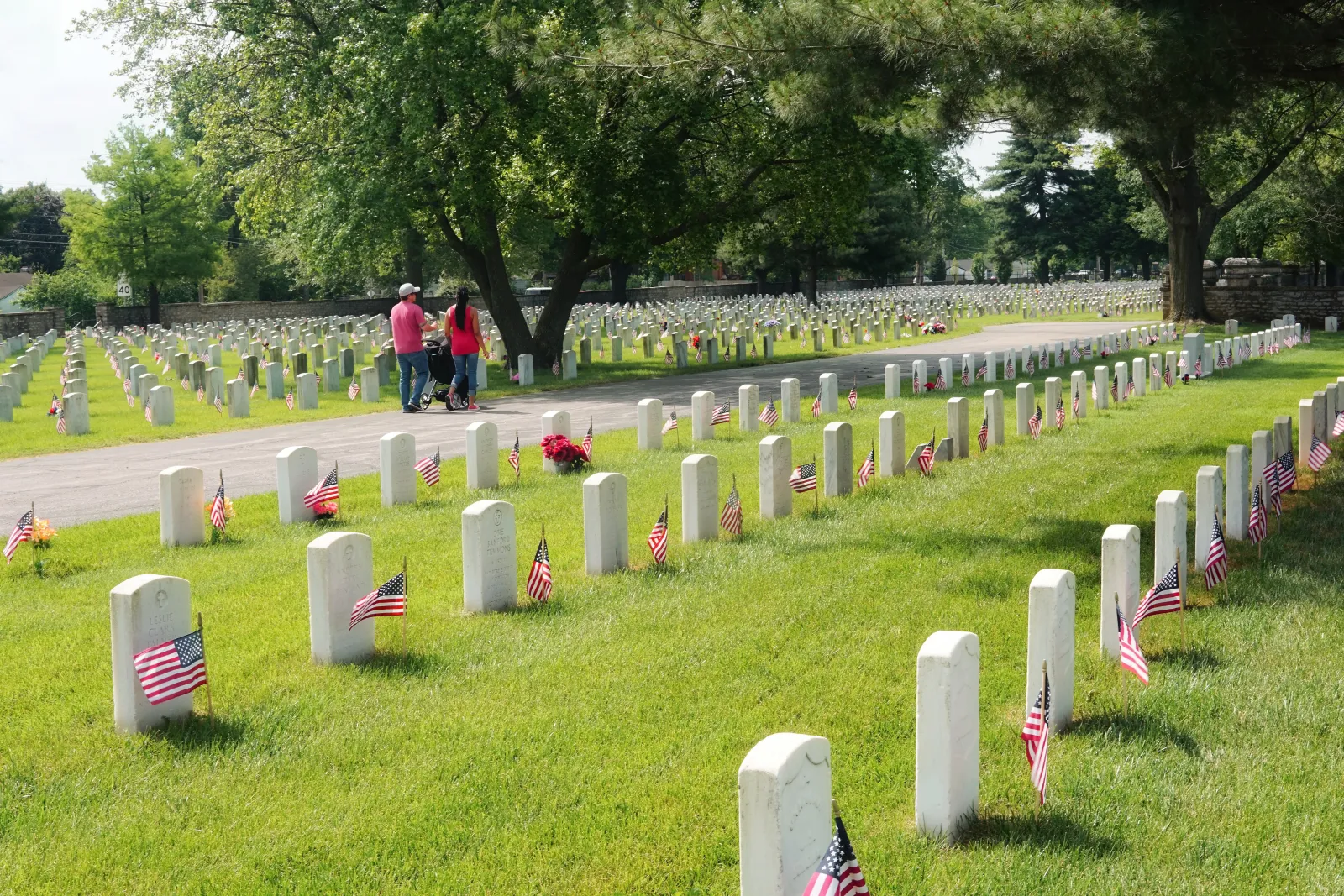
Members of the U.S. armed forces, whether in active service or retired veterans, deserve nothing but the utmost respect paid to them at their death. There are dozens of rules specific to military funeral etiquette, and you shouldn't be expected to be familiar with all of them.
If you lose a loved one who is entitled to be buried with full military honors, it can be helpful to familiarize yourself with what happens at a veteran's funeral. Here's what you can expect at a military funeral:
What Happens at a Veteran's Funeral?
Military funerals, especially the burial portion of the funeral, commonly incorporate the same events regardless of the branch of service the deceased veteran belonged to. One example of this is how any members of the armed forces in attendance are expected to wear their service dress uniforms.
These service members are expected to salute several times during the burial, including when the hearse passes in front of them, whenever the casket is moved, when the formal gun salute is given, whenever Taps is played, and when the casket is laid to rest in the ground. However, if you are a civilian attending a military funeral, you are not subject to any of these requirements.
Here is what you can expect at a military funeral along with some military funeral etiquette tips:
The Playing of Taps
The iconic bugle call of Taps is an old tradition, dating back to the middle of the 1800s. Originally a bugle call used by Union forces during the U.S. Civil War to indicate a call for lights out at the end of the day, it has since been used for military funerals and memorial services to symbolize the "lights going out" on the life of a valiant service member. At military funerals, Taps may be played live, or it may be played electronically.
The Presentation of the Flag
The ceremonial folding and presentation of the flag of the United States is a requirement for every military funeral. First, the flag is draped on a closed casket, with the blue and white stars set at the head and left shoulder of the deceased. Once Taps is played, the flag is removed and carefully folded 13 times into the symbolic tricorn shape before being presented to the family of the deceased. If the body was cremated, the flag begins in a military fold, is unfolded and held over the cremated remains, and then re-folded for presentation to the family.
The Three Volley Salute
Both Taps and the presentation of the flag are requirements at every military funeral. However, other traditions such as the three-volley salute are optional, though this gun salute is perhaps the most well-known military funeral tradition. It is represented by a military honor guard firing three blank rifle volleys into the air. The honor stems from a battlefield tradition where both opponents would fire volleys to signal they were collecting soldiers that fell during the battle to provide them with a burial.
People who have never attended such a service often wonder how many shots are fired at a military funeral, especially if they have young kids. Most often, there are three blank shots fired at a military funeral, since the three-volley salute is the most common tradition. Other military funeral customs that involve shots fired or loud noises are the 21-gun salute or the practice of firing cannon salutes.
The Military Flyover
The military flyover is a military funeral rite that is reserved for only the most important and high-profile service members. Typically, only generals, heads of state, and those who performed extreme heroics are provided with a military flyover during their funeral. Since this involves a military aircraft flying over the grave site, it makes sense that such a mobilization is rare.
Ceremonial Statements from Military Personnel
At military funerals, ceremonial statements are typically made by other military personnel. This personnel knows what to say at a military funeral, as there are standard words that need to be said at specific times. The most common of these sayings are spoken when the flag is presented to the family of the veteran, and usually take this form, along with whatever personal condolences the service member wishes to state:
"As a representative of the U.S. military, it is my high privilege to present to you this flag. Let this flag be a symbol of the appreciation this country feels for the service rendered and to our flag by your loved one."
Combining Military and Religious Funeral Rites
Military funeral honors should always be somber moments, filled with respect towards the deceased and their next of kin. These military honors can be given in conjunction with other types of burial rites, such as religious ones, with religious rites usually occurring first. The exception to this is the procession, where the pallbearers will transport the casket from the hearse to the graveside with the flag already draped over the casket.
From there, any applicable religious rites, such as the Catholic Rite of Committal, are carried out. Then, prior to the casket being laid to rest, the remaining aspects of the military funeral are performed. As mentioned above, both Taps and the ceremonial folding and presentation of the flag are always performed during a military funeral. Other optional military rites, such as the three-volley salute or military flyover, also occur before the casket is laid to rest.
Military Funeral Etiquette
Military funeral etiquette does not differ drastically from basic funeral etiquette. Military personnel should wear their uniforms and salute when necessary.
Civilians should keep the following common etiquette in mind when attending a military funeral:
- Dress nicely
- Wear black
- Be respectful
- Give your condolences to the direct loved ones
- Take time to reflect on how the deceased positively impacted your life
If you're wondering what to say at a military funeral, this too does not differ much from what you should say at a civilian funeral. In addition to the typical condolences, you might include thanks for the service the loved one provided for our country.
Military Funeral Rites
If you or your loved one served in the U.S. armed forces in any capacity, you are entitled to receive a military funeral with full honors if you were not given a dishonorable discharge. To learn more about military funeral honors, contact the U.S. Department of Veteran Affairs for additional information. To begin planning a funeral now or pre-planning in advance, find a cemetery or funeral home near you or call 844-808-3310 with any questions.

